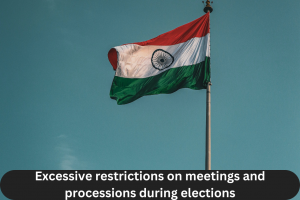ForumIAS announcing GS Foundation Program for UPSC CSE 2025-26 from 19 April. Click Here for more information.
Source – This post on Excessive restrictions on meetings and processions during elections has been created based on the article “Petition against poll-time curbs raises questions about public participation” published in “The Hindu” on 24 April 2024.
UPSC Syllabus – GS Paper 2 – Indian Polity-Historical Underpinnings, Evolution, Features, Amendments, Significant Provisions and Basic Structure.
Context– The article raises the issue of imposition of prohibitory order imposed during election time that restricts all public gatherings and meetings. This imposition has been challenged by certain activists before the Supreme Court.
In this case, petitioners have not been allowed to hold any public programmes aimed at creating awareness among voters about the election. SC has also raised the question against such blanket ban during hearing. It has directed executive magistrates to decide applications for public meetings and yatras within 3 days. Excessive restrictions on meetings and processions during elections
What is the rationale behind imposing such blanket prohibitory orders?
These orders are imposed by the police and revenue officers, who are vested with magisterial powers under Section 144 of the CrPC, to prevent any disturbance to public order during election campaigns.
Read more – Model Code of Conduct
What are the arguments against these blanket prohibitory orders?
1) Infringes upon voters right to know-These restrictions are also applied for civil society organization whose intention is to educate voters. This infringes upon the rights of voters to know about their contesting candidates.
2) Discourage public participation: Such restrictions are not justified against activities aimed at educating voters, which can limit public participation in the democratic process.
3) Statutory concerns: It also raises unclear questions:
i) Whether election can be a sufficient ground to make such activities subject to statutory discretion.
ii) Whether statutory powers may be transferred from the designated authority to the ECI during elections.
Question for practice
Does prevention of public order during election provide sufficient justification for blanket curbs on public participation?





